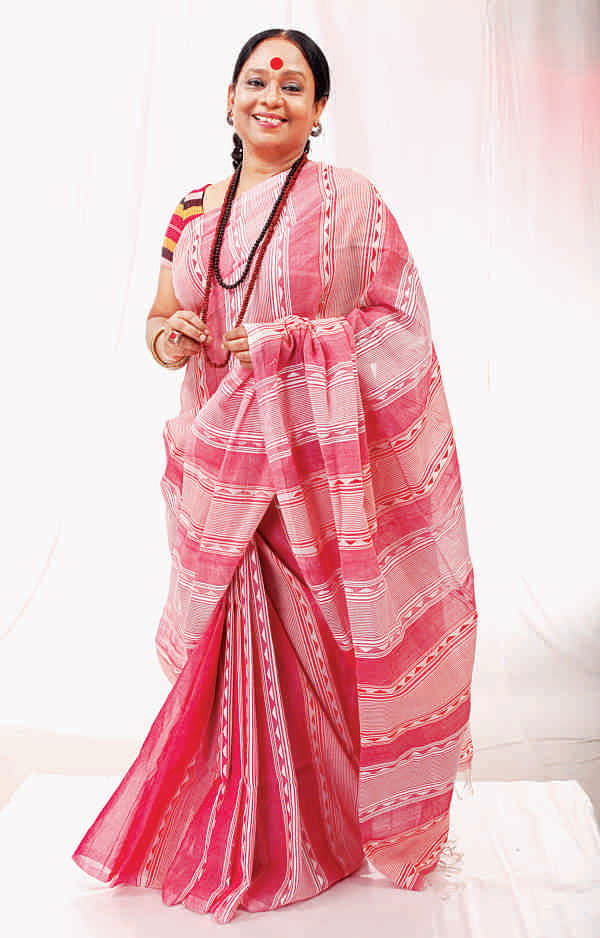WAHIDA MOLLICK JOLLY

The name Wahida Mollick Jolly is indistinguishable from the theatre in Bangladesh. As a theatre actor and activist, she participated in numerous stage performances and television dramas. She also appeared on the big screen in a few movies. She established a theatre group called 'Drishwakabbo' in 1990 with a view to spreading professional theatre in Bangladesh but that initiative was not sustainable. Wahida's family taught her the value of culture and the arts from a young age. Her elder sister Sharmili Ahmed is renowned for her acting; her father was a theatre-loving man and her mother used to play the Setar. Being a 'golden voice', as Momtazuddin Ahmed used to call her at her young age, Mollick joined radio dramas when she was in class two.
She is presently an Associate Professor in the Department of Theatre and Performance Studies at University of Dhaka. She studied both Social Work and Theatre. Her father settled in Rajshahi from the then West Bengal and Rajshahi was renowned for the practice of classical cultural art. She learnt to sing from her guru Ustad Haripad Das, but she did not pursue singing professionally. Presently, on top of acting, she finds interest in costume design and painting. Her short dramas 'Sonali Megher Bhela', 'Ghomta' and drama serial 'Anis Shaheber Ajob Songshar' is on air now in different television channels.
Career Highlights
Wahida Mollick started her radio dramas when she was in class two and she still enjoys it. Her first theatre work began in 1975 with a drama named 'Spartacus Bishoyok Jotilota' which was written by Momtazuddin Ahmed and directed by Proshanto Kumar Saha. Her debut television drama was back in 1986 and the name was 'Kii Jalaton' by Momtazuddin Ahmed. Apart from television and theatre performance, she appeared in the big screen with the movie 'Adhiar' in 1999. She also appeared in 'Shorgo Theke Norok'.
Philosophy
As a person, she is not driven by any particular philosophy. She says she has realized after years that 'a person is best known by the work he does' and everyone should perform his responsibility with honesty and dedication. She thinks punctuality is a great thing and anyone punctual can do things easily.
Thoughts on Bangladeshi Theatre
According to Wahida Mollick, theatre is not commercial because there is not enough budget and investment in theatre. The people involved in theatre works often have to spend their own money in the process. She thinks it is very important that a professional approach is taken among theatre activist herein. “Government patronage might help the theatre, but people concerned should come forward to boost up the process,” she says. Despite every negative and frustrating scenario, Mollick is very hopeful about the theatre practice in Bangladesh. Young learners are involving themselves in theatre and they have the zeal to change the scenario.
Thoughts on Bangladeshi Media
Wahida says that the number of television channels has risen in our country but the number of actors and actresses has not risen in comparison. Therefore, the same actors and actresses are seen performing everywhere. It creates pressure on them to deliver more in quantity. She also thinks it is not always obvious that one has to participate in theatre in order to perform well in the television dramas. She reminds young artists that “those who practice regularly improve in acting and do better in theatre and television” and suggests that everyone must read and understand acting in order to do well. Like any mature artist, she often criticizes her own work and feels that she still has much to learn. She admits that she does not get scripts that satisfy her all the time. She thinks more people are writing scripts nowadays but there is still lack of good dramatists in our country.
Favorites
Author: Rabindranath Tagore, Selim Al Deen, Badal Sarker, Henrik Ibsen, Anton Chekhov, Harold Pinter
Singers: Kanika Banerjee, Rizwana Chowdhury Bonna, Mita Haque
Drama: Rokto Korobi,
A Doll's House
Poet: Jibananada Das


 For all latest news, follow The Daily Star's Google News channel.
For all latest news, follow The Daily Star's Google News channel. 




Comments